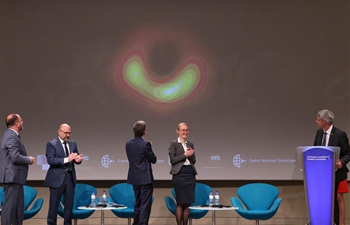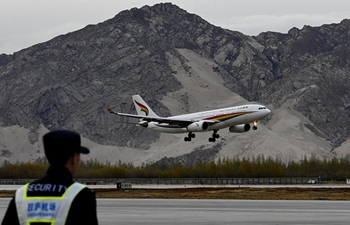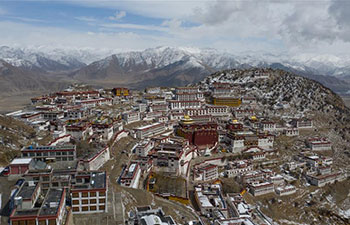 ?
?Guy Ryder (L), Director-General of the International Labour Organization (ILO), speaks to journalists with United Nations General Assembly (UNGA) President Maria Fernanda Espinosa Garces during a briefing on the high-level meeting to commemorate the 100th anniversary of the establishment of the ILO, at the UN headquarters in New York, on April 10, 2019. United Nations Secretary-General Antonio Guterres on Wednesday warned against the likely tremendous disruption in the labor market due to the fast advancement of high-technologies and other factors. (Xinhua/Li Muzi)
UNITED NATIONS, April 10 (Xinhua) -- United Nations Secretary-General Antonio Guterres on Wednesday warned against the likely tremendous disruption in the labor market due to the fast advancement of high-technologies and other factors.
"We will face tremendous disruption in the labor market, with an enormous amount of jobs created and jobs destroyed," the UN chief said at the General Assembly's 74th Plenary meeting to commemorate the 100th anniversary of the establishment of the International Labour Organization (ILO).
"We are living in a time of profound uncertainty, disruption and technological transformation," said the secretary-general. "Innovations such as artificial intelligence will help power economies and progress on the Sustainable Development Goals," but will bring tremendous changes in the labor market as well.
Noting that "the concept of work will change," and the relationship between work, leisure and other occupations too, the UN chief said that "we are not yet prepared for that."
"We obviously need a massive investment in education, but also a different sort of education, not just learning things but learning how to learn," he said.
"Since the digital economy operates in a world without borders, more than ever, international institutions must play a vital role in shaping the future of work we want," the UN chief noted.
Founded in Geneva, Switzerland in 1919, the ILO is a UN agency whose mandate is to advance social justice and promote decent work by setting international labor standards. The ILO is the first specialized agency of the UN with 187 member states.















